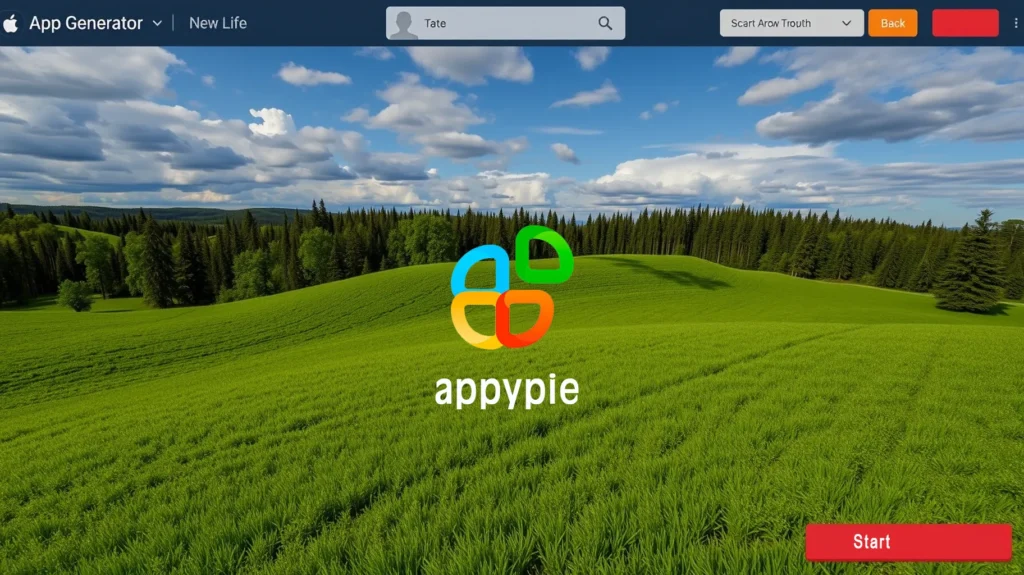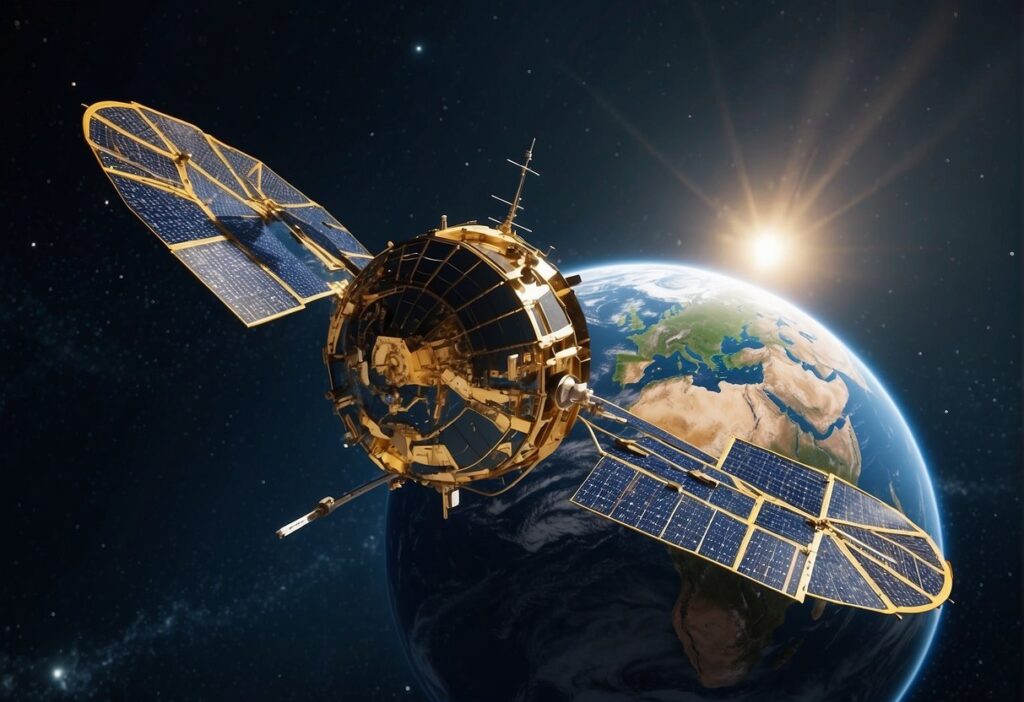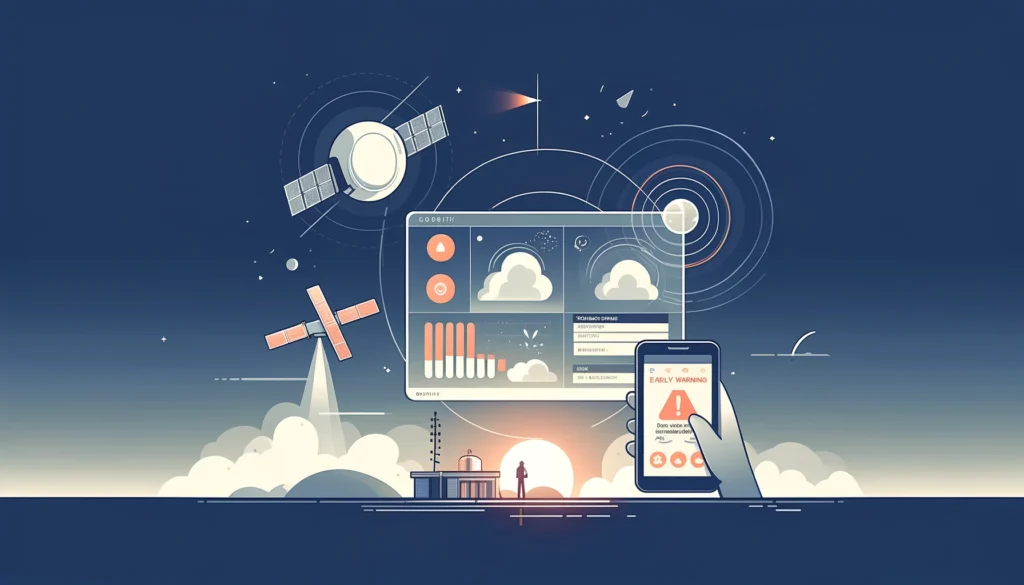Overview of AI in Nutrition
- Overview of AI in Nutrition
- Innovative Dietary Assessment
- Personalized Nutrition and Healthcare
- Challenges and Ethical Considerations
- Integrating AI with Other Scientific Domains
- AI-Driven Future of the Food Industry
- Can AI in Nutrition Assist Your Weight Loss Journey?
- FAQ's
- Successful Case Studies
- Resources
In the thrilling journey of nutritional science, we’ve welcomed artificial intelligence (AI) as a game-changing ally.
Our understanding of nutrition is evolving rapidly, and AI is catapulting us towards a future where health and diet intertwine with technology like never before.
We’re seeing the emergence of precision nutrition, where AI tailors recommendations perfectly suited to individual health needs.
AI in nutrition is revolutionizing how we approach our diets.
“With AI, every bite we take can be a step towards optimal health, as it crafts diets that are not just personalized, but predictive and preventive.”
kizen.com
By integrating machine learning algorithms, AI assists in analyzing vast amounts of dietary data, giving us insightful correlations between food intake and health outcomes.
We’re not just witnessing innovation; we’re part of a health transformation that is reshaping healthcare and wellness strategies.
Utilizing AI, we’re able to predict nutritional deficiencies and craft dietary plans that are as unique as each person’s DNA.
This isn’t just convenient; it could potentially lead to extraordinary benefits across our lives.
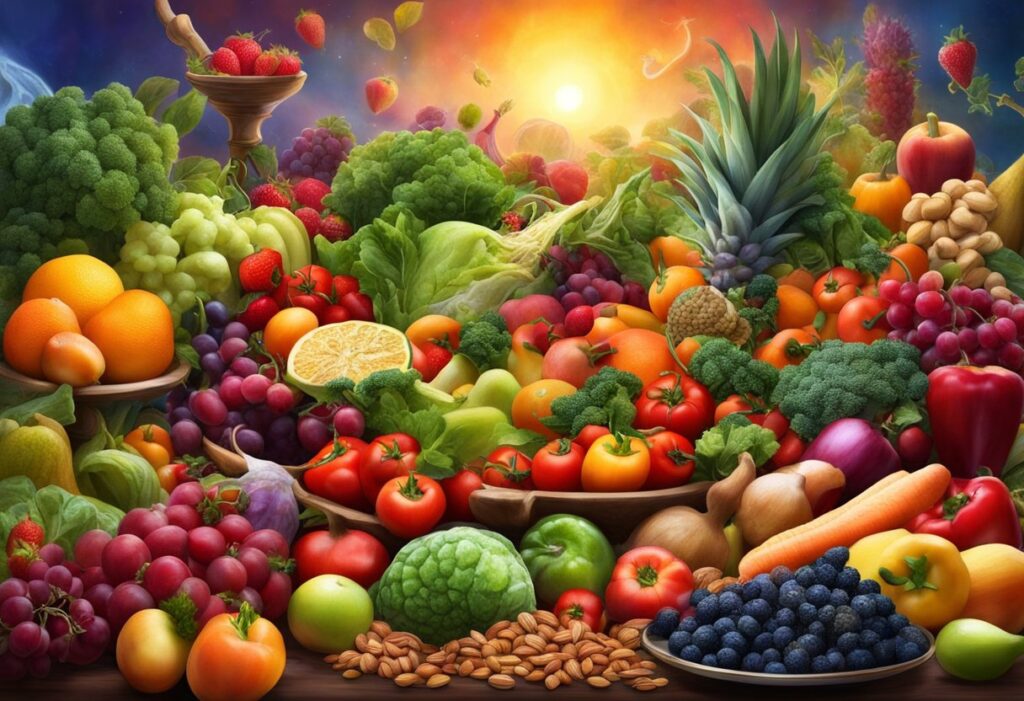
Imagine a world where every bite we take is a step towards optimal wellbeing – that’s the powerful impact AI promises in the realm of nutrition.
Through AI, we’re not simply following diets; we’re embarking on personalized nutrition journeys.
Each of us can rejoice in knowing that technology is empowering us to make smarter, more effective health decisions.
This synergy between AI and nutrition brings forth an era where every meal is a masterpiece of science, tailored to offer us the pinnacle of healthy living.
Innovative Dietary Assessment
In the landscape of nutrition, we’re unlocking new possibilities with artificial intelligence to make dietary assessment more accurate and user-friendly.
Image Recognition for Food Analysis
Harnessing AI’s potential, image recognition technology revolutionizes the way we track dietary intake.
By simply capturing a photo of our meals, AI algorithms analyze and quantify the calories present.
Tools like goFOOD™ exemplify how a snapshot from our smartphones can offer detailed nutritional information, propelling us towards more informed food choices.
Natural Language Processing in Diet Tracking
We’re embracing Natural Language Processing (NLP) to interpret and process our dietary descriptions just as a human would, but with greater speed and precision.
This approach allows dietary apps to understand the context and content of our food logs, transforming our spoken or typed words into actionable dietary data.
AI-Enhanced Dietary Apps
AI-enhanced dietary apps are our pocket-sized nutritionists, delivering personalized diet plans based on our unique dietary needs.
These apps go beyond mere food identification; they provide critical insights into nutrient density and offer suggestions for healthier eating habits.
We find eye-opening revelations within innovations like the emerging trends of technology-based dietary assessment that enhance the quality of our dietary tracking.
By stepping into this next-generation era of nutrition, we’re equipping ourselves with tools that foster better eating decisions and overall health.
Personalized Nutrition and Healthcare

In our breakneck world, personalized nutrition emerges as a cornerstone for maintaining our health.
Through advances in Artificial Intelligence (AI), we’re stepping into an era where each meal plan can be tailored to our unique needs.
Customized Diet Plans Using AI
Imagine a world where your meals are precisely calibrated to include the right balance of micronutrients and macronutrients, specifically designed for you. AI is making this a reality.
By analyzing our dietary preferences, health records, genetic makeup, and lifestyle choices, AI algorithms recommend optimal meal plans.
These customized plans not only cater to our taste buds but also precisely meet our dietary needs, helping us to manage weight and improve overall health.
For example, those aiming to combat obesity or heart disease can receive a diet plan rich in fiber and healthy fats, minimizing sodium and trans fats.
AI in Chronic Disease Management
We know that chronic diseases, such as type 2 diabetes, require diligent management of diet and lifestyle.
AI steps in as a relentless ally, continuously monitoring and adjusting our diet to maintain blood sugar levels within a safe range.
By processing real-time data, such as glucose readings and activity levels, AI provides actionable advice to keep chronic disease under tight control.
No longer is managing a condition like type 2 diabetes a distressing journey—we now have a powerful tool at our disposal that offers a beacon of hope for a healthier life.
Challenges and Ethical Considerations

In the realm of artificial intelligence in nutrition, we’re faced with critical challenges and ethical considerations hovering over the horizon, particularly in terms of bias and safety, along with the safeguarding of data privacy.
Addressing Bias and Safety in AI
To ensure that our technological advances serve everyone equitably, we must hardwire fairness into our AI systems.
We’ve observed that AI, when applied in nutrition, can inadvertently reflect biases inherent in its data sets. These biases could result in skewed nutritional advice potentially harming certain groups.
Moreover, safety stands as a non-negotiable aspect of AI in nutrition. AI’s recommendations must be thoroughly validated against established nutritional standards to safeguard user health.
Data Privacy and Ethical Concerns
The intimacy of data privacy envelops AI in nutrition with grave ethical concerns.
As we embrace AI to customize dietary plans, we handle sensitive information that demands the utmost confidentiality and ethical responsibility.
We are committed to maintaining stringent privacy measures to protect personal health information from unauthorized access
Integrating AI with Other Scientific Domains

Artificial Intelligence (AI) is revolutionizing how we harness the complexity of biological data in nutrition science.
By interweaving AI within other scientific domains, we’re paving the way for breakthroughs in personalized nutrition and a deeper understanding of human health.
Combining Genomics with Nutrition
In the realm of genomics and nutrition, we’re witnessing a transformative era where AI helps us tailor diets to individual genetic profiles.
With AI, we can process vast genomic datasets, unveiling specific dietary needs tied to one’s DNA. This fusion promises a future where our genetic makeup guides our food choices, optimizing health and preventing disease.
AI in Metabolomics and Microbiome Research
AI’s capability shines in metabolomics and microbiome research, as it sifts through intricate data revealing how substances in our bodies and gut microbiota respond to dietary intake.
Our journey towards precision medicine now encompasses the gut microbiome, with AI models predicting how this complex ecosystem affects metabolism and health.
By decoding these relationships, we’re inching closer to diets that are fine-tuned for individual well-being.
AI-Driven Future of the Food Industry

In this vibrant era of digital transformation, we’re witnessing a revolutionary shift in how we cultivate food and manage dietary intake, thanks to AI.
AI in Agriculture and Sustainable Practices
Imagine fields that communicate and tractors that learn; we are now harnessing AI to usher in a new epoch of smart agriculture.
AI’s predictive power is enabling farmers to make more informed decisions, enhancing yields while being kinder to the environment.
By analyzing big data on weather, soil health, and plant biology, AI-piloted drones and sensors offer timely insights for precision farming.
This symbiosis of high-tech tools and farming practices is carving a pathway not just toward more productive harvests but also toward a more sustainable future.
Technological Innovation in Food Production
We’re at the cusp of redefining the food industry with AI as our ally.
Sophisticated AI algorithms are optimizing food processing and distribution. They drastically reduce waste and improve health outcomes.
From fine-tuning the dietary intake based on individual health needs to crafting bespoke nutrition plans, AI is becoming the backbone of personalized nutrition.
Employing digital technology in food production is not just about efficiency. It’s also about a proactive stance on well-being, nudging us all towards a healthier lifestyle.
Can AI in Nutrition Assist Your Weight Loss Journey?
Understanding AI in Nutrition and Weight Management

Embarking on a weight management journey? Embrace the power of AI! This tech brings tailored nutritional advice and sharp assessments right to your plate.
The Role of AI in Personalized Nutrition
In the exciting world of personalized nutrition, AI is akin to a meticulous chef crafting a unique dietary plan just for you. We’re not talking about generic advice; these are precision-tailored eating strategies.
Artificial intelligence sifts through heaps of data about our health and food preferences to suggest nutrient-rich meals that align with our weight goals and bring joy to our taste buds.
AI and Dietary Assessment
Keeping track of what we eat can be a slog. But, AI makes it a breeze by transforming our food logs into insightful nutritional summaries.
AI-powered apps can now analyze our dietary intake with just a click. This quick and accurate assessment ensures that we stay informed about the balance and quality of our diet.
Machine Learning for Predicting Weight Changes
Imagine if we could predict the future of our weight management efforts. Well, machine learning is the crystal ball we’ve been waiting for!
By examining historical data and eating habits, these smart algorithms give us a heads-up on potential weight changes. With their predictive insights, we can take proactive steps to stay on course.
Innovations in Food Recognition and Nutrient Analysis
A feast for the eyes becomes a feast of data with computer vision (CV) innovations.
Image recognition has transformed how we understand our meals.
Snap a photo, and AI dives deep into its vast knowledge pool to identify the food and break down the nutrients.
Bid farewell to manual calorie counts—AI’s sharp eye for food recognition does the heavy lifting, enhancing our health and simplifying our weight management journey.
By weaving in these cutting-edge techniques from AI and machine learning, we’re no longer guessing our way to better health.
Instead, we’re armed with concrete, personalized guidance that can help us achieve our weight goals with precision and ease.
How can I find an AI-powered nutrition app for myself?
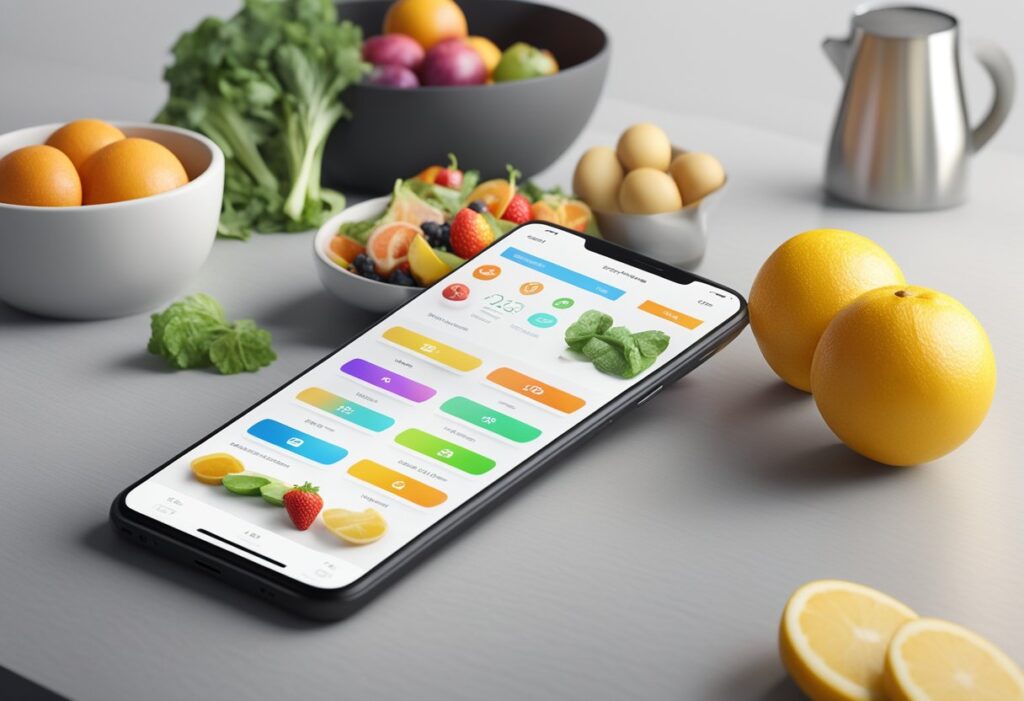
Finding an AI-powered nutrition app that suits your needs can be quite straightforward. Here are some steps you can follow:
- Identify Your Goals: Determine what you want from a nutrition app. Are you looking to lose weight, gain muscle, or simply maintain a healthy diet?
- Research: Look for apps that specialize in AI-powered nutrition. Read reviews and check ratings on app stores.
- Features to Look For:
- Personalized Meal Plans: The app should offer meal plans tailored to your dietary needs and preferences.
- Macro and Calorie Tracking: It should track your intake of macronutrients and calories.
- Integration with Wearables: Check if the app can sync with fitness trackers or smartwatches to monitor your activity levels.
- Real-time Feedback: The app should provide real-time insights and suggestions based on your diet and goals.
- Try Out Free Versions: Many apps offer free versions or trial periods. Use this opportunity to explore the app’s interface and features.
- Consult Reviews and Testimonials: Look for user experiences and testimonials, especially those that align with your goals.
- Consider Privacy and Data Security: Ensure the app has a clear privacy policy and secure data handling practices.
- Support and Community: An active community or support from nutritionists can be valuable for motivation and guidance.
Here are two AI-powered nutrition apps that you might find useful:
- Calorik: This app offers ultrafast nutrition, calorie, and macro counting, using AI to predict calories and macros even if you don’t know all the ingredients.
- NutriBot: NutriBot provides tailored nutrition plans and real-time expert advice, along with customized workout routines based on individual goals and preferences.
Remember to consult with a healthcare provider before making significant changes to your diet or if you have specific health conditions. They can provide guidance on whether an AI-powered nutrition app is suitable for you.
FAQ’s
- What’s the scoop on AI in nutrition? Imagine a smart chef that knows you better than you know yourself—that’s AI in nutrition! It’s all about tech-savvy dietary advice that’s as unique as your taste in music.
- How does AI whip up my perfect diet plan? Think of AI as your personal nutritionist in your pocket, mixing up a diet cocktail that’s tailored just for you, based on your health data smoothie!
- Can AI help me win the battle of the bulge? Absolutely! AI is like your gym buddy who also knows a thing or two about salads. It helps you manage your weight by keeping tabs on your munchies and crunches.
- What are the yummy benefits of AI diet planning? It’s like having a magic plate that fills up with food that’s good for you and tastes great. Personalized meals, easy tracking, and a happy tummy are just the start!
- Got any cool AI diet apps to recommend? Sure do! There are a bunch of apps out there that are like having a diet genie in your phone, ready to grant your healthy eating wishes with a tap.
- What if I’m allergic to peanuts or hate broccoli? No worries! AI’s got your back, making sure your meals are free from no-nos and full of yes-yeses.
- What’s on the horizon for AI and my meals? The future’s looking tasty with AI! Expect even smarter snack suggestions, wearable tech that chats with your fridge, and a whole lot more.
Successful Case Studies
- Nutrigenomix Study: A study by Nutrigenomix revealed that 75% of participants reported improved adherence to personalized diets guided by AI, indicating a significant positive impact on diet management.
- AI4FoodDB: The AI4Food database is a comprehensive collection of data from a nutritional weight loss intervention involving 100 overweight and obese participants. It includes food images, wearable sensor data, validated questionnaires, and biological samples, offering a unique resource for advancing AI techniques in personalized care.
- Pilot Clinical Study for IBS: An AI-based diet was designed to optimize a personalized nutritional strategy considering individual gut microbiome features. This approach aimed to modulate the microbiome towards healthier scores, showing promise for conditions like Irritable Bowel Syndrome (IBS).
A true success story that showcases the impact of AI in personalized nutrition
Emma’s Journey to Health with AI Nutrition:
Emma, a 35-year-old software developer, struggled with weight fluctuations and managing her type 2 diabetes. She tried various diets, but none seemed to work long-term. That’s when she discovered an AI-powered nutrition app that promised a personalized approach to her dietary needs.
The app used machine learning algorithms to analyze Emma’s eating habits, health data, and personal preferences. It then created a customized meal plan that considered her diabetes and weight loss goals. The app also provided real-time feedback and adjusted her diet based on her blood sugar levels and activity data from her fitness tracker.
Within six months, Emma saw remarkable results:
- Her HbA1c levels dropped significantly, indicating better blood sugar control.
- She lost 20 pounds and reported feeling more energetic and healthier overall.
- The app’s continuous monitoring and adaptive meal planning helped her make sustainable lifestyle changes.

Resources
Here are some resources that discuss the role of AI in nutrition and its potential to assist in weight loss:
- The Potential of AI in Enhancing Adult Weight Loss: This scoping review presents an overview of how AI could be used to regulate eating and dietary behaviors, exercise behaviors, and weight loss, proposing a framework for the applicability of AI in weight loss.
- AI in Personalized Nutrition and Diet: Transforming the Way You Eat: This article explores the transformative power of AI in personalized nutrition and diets, highlighting how it can lead to more informed dietary choices and effective health management.
- Transforming Weight Loss with AI: A Comprehensive Overview: A summary of how AI tools can supplement professional advice to optimize weight loss strategies and make more informed decisions.
- AI Can Coach You to Lose Weight. But a Human Touch Still Helps: Discusses the ability of AI to mimic human problem-solving in planning exercise routines, tracking nutrition, and setting goals for weight loss, while emphasizing the importance of human interaction.
These resources provide valuable insights into how AI is being integrated into the field of nutrition and weight management, offering new ways to approach diet planning and health optimization.
| Insight | These insights reflect the multifaceted impact of AI in the field of nutrition, emphasizing its role in personalizing diet plans, predicting health outcomes, and promoting preventive health measures through technology. |
|---|---|
| Personalization | AI algorithms analyze individual health data to create highly personalized diet plans. |
| Predictive Analysis | AI predicts future health outcomes based on dietary habits and suggests modifications. |
| Real-time Adaptation | AI adjusts dietary recommendations in real-time based on ongoing health data. |
| Preventive Nutrition | AI identifies potential deficiencies or health issues and recommends dietary changes to prevent them. |
| Educational Tool | AI educates individuals on nutritional values and healthy eating habits. |
| Accessibility | AI makes expert nutrition advice more accessible to a wider population. |
| Data-Driven Decisions | AI uses large datasets to make evidence-based dietary recommendations. |
| Behavioral Insights | AI understands and adapts to individual eating behaviors and preferences. |
Insightful Quotes
“AI Diet: Artificial Intelligence Bots Write Weight Loss Programs”:
“If the AI has got it right, it means that when it comes to weight loss, one size does not fit all, and that we should be eating a customized diet. AI could help us crunch the huge numbers it takes to assess each individual and their massive datasets.”
“The potential of artificial intelligence in enhancing adult weight loss: a scoping review”:
“The use of AI for weight loss is still undeveloped. Based on the current study findings, we proposed a framework on the applicability of AI for weight loss but cautioned its contingency upon engagement and contextualization.”
“The Impact of AI-Powered Nutrition Apps on Dietetics”:
“AI will take away jobs from dietitians. Although AI may be able to reason, solve problems, and make decisions, dietitians offer unique skills to provide nutrition counseling. AI can complement the nutrition care process through efficiency and monitoring.
“AI is changing the way we lose weight – forever!”:
“There is no one-size-fits-all diet or weight loss program, and most aren’t explicitly tailored to you. Artificial Intelligence will be the future of weight loss and, more importantly, a more effective means of losing weight. Traditional weight-loss programs are flawed.

